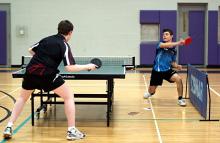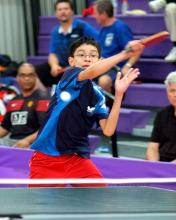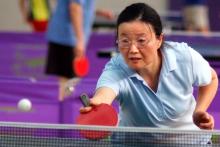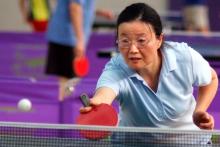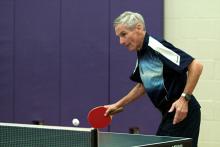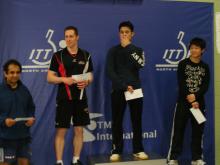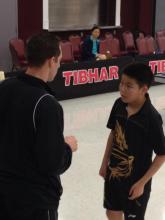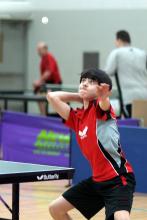by Samson Dubina on Sat, 2014-03-29 06:37
Four Tips to Mental Victory in Duece Games!
In an average tournament, you might have around 20 games that are 9-9 or 10-10. Your success or failure during the tournament largely rests on winning those games. I have a few tips that will help you better win those important sets.
#1 Enjoy them! You probably enjoy the rush from other things in life like roller coasters, scary movies, caffine, and other things. If you feel a bit excited in a close game and your heart is pounding a bit harder, learn to enjoy it! Enjoying those close games with a smile will help you to relax and play your best!
by Samson Dubina on Mon, 2014-03-03 08:33
Samson offers some advice on what to do when you find yourself losing a big game
I am playing a very important match in a tournament; I am losing 2-0 in games and now losing 5-0 in the third game. What should I do?
The first thing is… Never give up! I have won many matches because of a third-game comeback. My opponent starts crying to himself that he should have finished the match and the momentum swings to me.
The second thing is… Call time out. A friend or coach might be able to give me tips, insights, or encouragement which could really help.
by Samson Dubina on Tue, 2014-02-25 19:52
Learn the Fastest Way to Improve Your Game!
The Fastest Way to Improve
If you would like to improve your game 50-100 points in the near future, focus on improving your ball placement. To make stroke changes, it takes persistent coaching over an extended period of time. However, if you can take the strokes that you currently have and improve your placement, then you should see instant progress.
by Samson Dubina on Tue, 2014-02-18 19:46
Learn How to Become a World Class Player!
Question: Samson, how can I improve my mental game?
Answer: Choose a level-headed, world-class player and copy him.
When studying this elite athlete there are several things that you should be looking for.
Attitude During Training
by Samson Dubina on Wed, 2014-02-12 11:57
Written By Richard McAfee
One of the most difficult skills for the average player to learn is match strategy. There are several reasons for this.
1. It requires the ability to focus on what your opponent is doing. This can be difficult when your own strokes are not sound.
2. It requires a lot of experience to realize what strategies work against different styles.
3. Finally, it is hard to fine much in writing regarding match tactics. This is largely due to the complexity and individuality of the issue.
by Samson Dubina on Sun, 2014-02-09 18:19
Written By ITTF Coach Richard McAfee
Modern Table Tennis Styles
By Richard McAfee
USATT Certified National Coach
by Samson Dubina on Sun, 2014-01-26 17:39
Look for these 4 important clues!
When playing a tournament, you might not be familiar with your opponent. In this blog, I am going to list a few quick things to look for in the first 30 seconds of a match. Implement these ideals, and you will be able to immediately form a game strategy.
#1 Rubber
by Samson Dubina on Tue, 2014-01-21 11:37
Playing at an Elite Level Starts by Thinking at an Elite Level
This year, set some high goals in table tennis and work consistently to reach these goals. Look ahead to the competition 200-rating points ahead of you and think about your previous matches against them in tournaments. What shots worked? What shots didn’t work? Did you need to alter your strategy?
by Samson Dubina on Tue, 2014-01-21 11:11
Learn 8 Key Points to Improve Your Game Strategy
Here in the Midwest, the Seemiller grip is fairly common among older players. There are 3 different versions of the grip, but we won’t go into the details about the grip itself. We will look more closely at the strategy against these players.
by Samson Dubina on Sun, 2014-01-19 00:33
Learn How to Build Your Confidence!
In table tennis, try your best to build an early lead in points, try your best to win the first game, try your best to win the match 3-0.
One of my students recently lost to a player who had an amazing forehand and a terrible backhand. This opponent’s forehand was at least 1900-level and his backhand was around 800-1000 level. After losing, I asked my student why he played so many balls to the forehand. He responded by saying, “Well, I didn’t want my opponent to know that I knew his weak point.” What a terrible way to lose a match.
Pages




